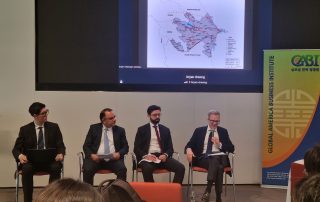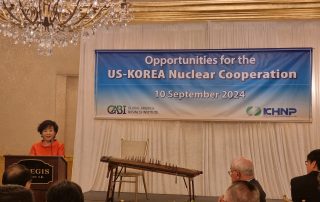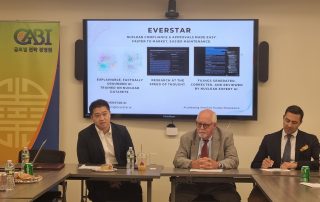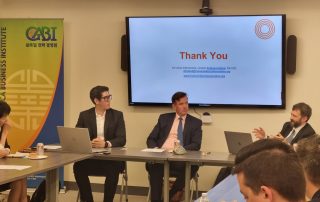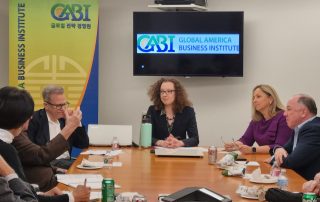GABI organizes nuclear energy roundtable discussions on a diverse range of topics that are relevant to nuclear markets both in the United States and globally. The discussion topics range from the civil nuclear partnerships, nuclear safety, nonproliferation, spent fuel management, international R&D and commercial collaboration, market and industry forecasts, and other related topics.
Diving Into Data Center Demand
Data centers and AI represent a significant portion of the growing energy demand, and the power needs of data centers in the US exceed power needs of some nations. Nuclear power provides a unique synergistic opportunity for the data center energy needs. This program discussed the energy demands for data centers, energy demand forecasts for
Elevating International Nuclear Collaboration
The United States has a number of international nuclear collaborations including efforts in Ukraine as well as South Korea. The United States and Ukraine are collaborating on workforce development. Clean Energy Training Centers have been established to provide regional workforce training. Joint initiatives include curriculum development, educational exchanges, and cooperative agreements supported by the U.S.
Domestic and International Ambitions in Nuclear Energy
The Science, Space and Technology Committee in the House has focused heavily on a number of energy and nuclear focused activities to support the US nuclear industry domestically. There are a number of nuclear supportive legislations that have resulted from this committee including the legislation to support the Advanced Reactor Deployment Program (ARDP). The opportunities
What to Expect at COP29
At COP29, the US is looking to engage in negotiations while also looking for pathways to implement the actions agreed to in the negotiations. These negotiations will cover a wide array of topics including deforestation, energy, human rights, and more. Azerbaijan is the host for COP29. Azerbaijan is a fossil fuel nation, and in the
Integrating Artificial Intelligence (AI) with Nuclear Energy
There are a number of challenges facing the nuclear industry when it comes to rapidly deploying nuclear energy technologies to meet growing energy needs. Artificial Intelligence has progressed to a point where it can provide significant benefits to the nuclear industry particularly in streamlining the time and resources necessary to perform certain functions such as
Advanced Reactor Licensing and Industrial Applications
The U.S. Nuclear Regulatory Commission (NRC) has made significant progress in recent years to update the regulations to adapt to the incoming wave of new reactor designs from small modular reactors and microreactors to advanced reactor designs. There are new licensing frameworks being developed to enable the licensing of new reactors to meet demand needs
Innovations in Nuclear Public Private Partnerships
As the US Government moves to support nuclear fission and fusion strongly, new public-private partnerships agreements have been made that reflect performance-based, fixed-price milestone contracts. Initially demonstrated with significant success in the space industry between NASA and SpaceX, these milestones based contracts can enable significant advancements in nuclear reactor demonstration projects as well as nuclear
Pathways to Meeting COP28 Pledges: Moving from Ambition to Action
Nuclear energy has gained unprecedented international focus. The conversation around nuclear has changed fundamentally towards finding pathways to enable nuclear. Previously, conversations were still centered around whether nuclear would be the right technology choice for the energy needs of the future, but it has largely been accepted now that nuclear will be a significant key




